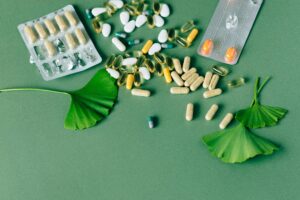
Nutrahara Blog
Nutrahara Blog
Top Menopause Diet Supplements to Support Hormone Balance and Overall Health
1. Introduction to Menopause Diet Supplements
Menopause is a natural transition marking the end of a woman’s reproductive years, usually occurring between ages 45 and 55. While it’s not an illness, the hormonal changes—primarily a decrease in estrogen and progesterone—can cause a wide variety of symptoms. These include hot flashes, night sweats, mood swings, sleep disturbances, vaginal dryness, reduced bone density, and changes in metabolism. The intensity and combination of symptoms vary greatly from woman to woman, but many find them disruptive to daily life.
Menopause diet supplements have become a popular option for women seeking non-hormonal solutions. These supplements are designed to provide nutrients and herbal compounds that help the body adapt to hormonal shifts. Unlike hormone replacement therapy (HRT), they focus on supporting the body’s natural processes through vitamins, minerals, phytoestrogenic herbs, adaptogens, and probiotics.
Incorporating menopause diet supplements into a daily routine can help bridge nutritional gaps, improve quality of life, and support long-term health. They are most effective when combined with a balanced diet, regular physical activity, stress management, and adequate sleep. This article will explore their benefits, ingredients, how to choose the right formula, and real-life testimonials from women who have experienced their positive impact.
2. Key Benefits of Menopause Diet Supplements
Menopause diet supplements are formulated to address the most common physical and emotional changes associated with menopause. By using a combination of nutrients, herbs, and probiotics, they aim to reduce discomfort, prevent deficiencies, and support the systems most affected by hormonal decline. The benefits go beyond symptom relief, extending into long-term wellness.
2.1 Hormonal Balance Support
One of the main benefits of menopause diet supplements is their ability to support hormonal balance without synthetic hormones. Ingredients such as black cohosh, red clover, dong quai, and chasteberry contain compounds that can bind to estrogen receptors and produce mild estrogenic or progesterone-like effects.
2.2 Bone and Joint Health
The drop in estrogen during menopause accelerates bone loss, increasing the risk of osteoporosis and fractures. Menopause diet supplements often include bone-supportive nutrients such as vitamin D, calcium, magnesium, and vitamin K2 to counteract this effect.
2.3 Mood, Sleep, and Cognitive Support
Menopause can bring mood swings, irritability, anxiety, and cognitive changes often described as “brain fog.” These are partly due to hormonal changes and partly due to sleep disturbances from night sweats or insomnia.
Menopause diet supplements can support mental well-being through ingredients like B vitamins (especially B6 and B12), magnesium, and adaptogens. B6 supports serotonin production, improving mood and sleep. Magnesium helps the body relax, promoting better rest. Adaptogens like rhodiola and ashwagandha help regulate stress hormones, which can reduce anxiety and mental fatigue.
2.4 Digestive and Gut Microbiome Health
Digestive changes are common during menopause, partly due to hormonal shifts and partly due to aging. A healthy gut microbiome is essential for efficient nutrient absorption, immune function, and even hormone regulation.
Many menopause diet supplements include probiotics to introduce beneficial bacteria and prebiotics like chicory root fiber to feed them. These can reduce bloating, improve bowel regularity, and enhance nutrient uptake. A balanced gut microbiome also plays a role in metabolizing estrogen, which can influence the severity of certain symptoms.
3. Common Ingredients in Menopause Diet Supplements
The effectiveness of menopause diet supplements depends largely on the quality and combination of their ingredients. A thoughtfully designed formula will address multiple aspects of health, including hormonal balance, bone density, mood, sleep, and digestion. Below are nine of the most common and beneficial ingredients found in high-quality menopause diet supplements, along with their key roles.
3.1 Black Cohosh
Black cohosh is one of the most well-researched herbal remedies for menopausal symptoms and a frequent inclusion in menopause diet supplements. Native to North America, it has been traditionally used by Indigenous communities for women’s reproductive health. Its active compounds are believed to interact with serotonin receptors in the brain, helping regulate body temperature and mood.
3.2 Dong Quai
Dong quai, often called “female ginseng,” has been a staple of Traditional Chinese Medicine for centuries. It is highly valued in menopause diet supplements for its potential phytoestrogenic activity, which may help balance estrogen levels naturally.
3.3 Red Clover
Red clover is a rich source of isoflavones—plant compounds structurally similar to estrogen. These isoflavones can bind to estrogen receptors, producing mild estrogenic effects that may help reduce the frequency and severity of hot flashes and night sweats.
3.4 Maca Root
Maca root, native to the Peruvian Andes, is an adaptogen rather than a direct phytoestrogen. This means it helps the body adapt to stress and maintain balance across multiple systems. In menopause diet supplements, maca is prized for its ability to improve energy, mood stability, and libido.
3.5 Chasteberry
Chasteberry (Vitex agnus-castus) is known for its hormone-regulating properties, especially in balancing progesterone and estrogen levels. In menopause diet supplements, it is often used to address mood swings, breast tenderness, and headaches related to hormonal fluctuations.
3.6 B Vitamins
B vitamins—especially B6, B12, and folate—are vital for energy production, brain health, and neurotransmitter synthesis. In menopause diet supplements, they help combat fatigue, improve mood, and support cognitive function.
3.7 Vitamin D
Vitamin D is crucial for bone health, immune function, and mood regulation—making it a key nutrient in menopause diet supplements. As estrogen declines, bone density can decrease rapidly, increasing the risk of osteoporosis. Vitamin D helps the body absorb calcium efficiently, protecting bone strength.
3.8 Magnesium
Magnesium supports over 300 biochemical reactions in the body, including muscle relaxation, nerve transmission, and energy production. In menopause diet supplements, it is included for its calming effects on the nervous system, ability to improve sleep quality, and role in maintaining bone density.
3.9 Probiotics and Prebiotics
Gut health plays a surprisingly influential role in hormone balance. Probiotics introduce beneficial bacteria that aid digestion, enhance immune function, and assist in estrogen metabolism. Prebiotics, like chicory root fiber and inulin, feed these beneficial microbes, helping them thrive.
4. Nutrahara’s Approach to Menopause Diet Supplements
Nutrahara has developed various supplements for women with Dong Quai, Black Cohosh, Prebiotics & Probiotics, designed to address the multi-faceted nature of menopause. Unlike single-ingredient products, this formula blends herbal extracts, vitamins, minerals, and gut health ingredients to create comprehensive support.
The herbal blend includes black cohosh, dong quai, red clover, chasteberry, and maca root—each chosen for its role in supporting hormonal balance, reducing hot flashes, and easing mood fluctuations. Adaptogens like ashwagandha and rhodiola help regulate stress responses, improving resilience and energy.
Nutrahara also incorporates a unique digestive health component: a multi-strain probiotic blend with Lactobacillus acidophilus, Bifidobacterium lactis, Lactobacillus plantarum, and Lactobacillus paracasei. These strains are paired with prebiotics like chicory root and artichoke extract to nourish beneficial gut bacteria. This gut focus supports nutrient absorption and may indirectly help regulate hormone metabolism.
Essential vitamins such as B6, D, and E are included to promote bone density, immune function, and mood stability. All ingredients are non-GMO, gluten-free, soy-free, and dye-free, and the product is manufactured in a GMP-certified facility. This clean-label, multi-target approach makes Nutrahara’s formula stand out among menopause diet supplements.
4.1 Nutrahara Menopause Supplement Overview
The Nutrahara Women Supplements formulated with the understanding that menopause is not just about hormone loss—it’s a whole-body transition. By combining multiple categories of support into one daily supplement, it simplifies the wellness routine for busy women.
The hormonal support category includes black cohosh and dong quai to address vasomotor symptoms, red clover for bone density and heart health, and chasteberry to help balance progesterone levels. Maca root provides adaptogenic support for energy and libido.
The gut health category includes prebiotics and probiotics to aid digestion, reduce bloating, and improve nutrient absorption—critical during a stage when metabolism and digestive function can change.
The nutrient support category provides vitamin D for bone and immune health, vitamin B6 for mood and energy, and vitamin E for antioxidant protection. Together, these create a synergistic effect that addresses immediate discomforts while promoting long-term health.
By integrating these categories, the Nutrahara Menopause Supplement reduces the need for multiple separate products, making it an efficient and cost-effective choice for women seeking comprehensive menopausal support.
4.2 Unique Ingredient Synergy and Quality Standards
One of the standout features of Nutrahara’s menopause diet supplements is the way ingredients are combined for synergy. Rather than simply listing popular herbs, the formula is balanced to ensure that each component enhances the others’ effects. For example, black cohosh and red clover both target hot flashes but through slightly different mechanisms, making them more effective together.
Adaptogens like ashwagandha help the body cope with stress, which can otherwise worsen menopausal symptoms. When paired with B vitamins, they enhance mental clarity and energy levels. Probiotics improve gut health, which in turn helps the body utilize vitamins and minerals more efficiently, maximizing the supplement’s benefits.
Nutrahara also adheres to strict quality control. The supplement is produced in a GMP-certified facility, ensuring consistent potency and safety. Ingredients are non-GMO, gluten-free, soy-free, and free of artificial dyes. These standards are important because menopause is a sensitive stage where the body may react more strongly to low-quality additives.
By combining scientific formulation with clean-label standards, Nutrahara offers a menopause diet supplement that is both effective and safe for long-term use.
5. Testimonials from Women Using Menopause Diet Supplements
Real-world experiences can provide valuable insight into how menopause diet supplements work in daily life. These testimonials represent fictional but realistic stories from women who have incorporated such supplements into their routines.
5.1 Sarah’s Story
“At 52, my hot flashes were waking me up three or four times a night, leaving me exhausted at work. I decided to try a menopause diet supplement that combined black cohosh and probiotics. After about a month, I noticed my night sweats were less frequent, and I was sleeping through the night more often. My digestion also improved, and I felt less bloated. It wasn’t an overnight change, but the steady progress made a big difference in my energy and mood. I also like that it’s a natural approach without hormones, which was important to me given my family health history.”
5.2 Linda’s Story
“I’m 56, and I had been struggling with mood swings, irritability, and constant bloating. A friend recommended Nutrahara’s Menopause Supplement. I liked that it had a mix of herbs like dong quai and red clover, plus prebiotics and probiotics. Within six weeks, my digestion felt smoother, and my mood swings were less intense. I also had more steady energy throughout the day, which helped me stay active and exercise regularly. The fact that it’s non-GMO and made in a GMP-certified facility gave me confidence in the quality. I’m still taking it daily, and it’s become a key part of my wellness routine.”
5.3 Maria’s Story
“When I turned 49, I started noticing brain fog and afternoon crashes that made it hard to concentrate at my job. I tried a menopause diet supplement with red clover, maca root, and B vitamins. After a couple of months, I felt sharper and more productive. The brain fog wasn’t gone completely, but it was noticeably less frequent. I also felt my energy last longer into the evening, which was a nice change. I pair the supplement with yoga and a healthy diet, and I think the combination is what’s really helping me feel balanced during this transition.”
5.4 Emily’s Story
“At 54, I was worried about my bone health because my mother had osteoporosis. I chose a menopause diet supplement that included vitamin D, magnesium, and phytoestrogenic herbs. Over the last year, I’ve kept up with regular walks, light strength training, and the supplement. My last bone density scan showed stability, which was a relief. I’ve also noticed that I sleep better and wake up with fewer aches in my joints. I appreciate that the supplement targets multiple areas at once—bones, mood, and sleep—so I don’t have to juggle a bunch of different pills every day.”
5.5 Janet’s Story
“I’m 58, and hot flashes were my biggest problem—they were happening at least 10 times a day. I didn’t want hormone therapy, so I looked into natural options and found a menopause diet supplement with dong quai, chasteberry, and probiotics. It took about two months to see a difference, but the flashes have dropped to maybe two or three a day, and they’re milder. I also feel less tense, and my digestion has improved. The slow but steady change was worth it, and I feel more in control of my body again.”
6. Conclusion on Menopause Diet Supplements
Menopause is a complex life stage that impacts physical, emotional, and mental well-being. While every woman’s experience is unique, common challenges like hot flashes, mood swings, sleep problems, and bone loss can significantly affect quality of life. Menopause diet supplements offer a non-hormonal approach to easing these symptoms and supporting overall health.
The best menopause diet supplements combine multiple forms of support: phytoestrogenic herbs for hormonal balance, vitamins and minerals for bone and energy, adaptogens for stress resilience, and probiotics with prebiotics for gut health. Products like Nutrahara’s Menopause Supplement stand out by integrating all these elements into one formula, simplifying daily routines while delivering broad benefits.
To maximize results, supplements should be chosen based on quality, ingredient transparency, and personal health needs. Consulting a healthcare provider, tracking progress, and pairing supplements with healthy lifestyle habits will yield the best long-term outcomes.
Menopause is not just an ending—it’s the beginning of a new chapter in life. With the right support, including well-formulated menopause diet supplements, women can navigate this transition with greater comfort, confidence, and vitality, embracing the years ahead as a time of strength and renewal.
Disclaimer: This article is not a substitute for medical advice. Please consult a healthcare professional before starting any supplement, especially if pregnant, nursing, taking medication, or managing health conditions.
Written by the Nutrahara Team
This article was developed by the Nutrahara team of nutrition scientists and naturopaths, who specialize in formulating safe, effective, and science-backed supplements for women’s health. Every ingredient we use is carefully selected to support your body’s unique needs—naturally. Follow us on LinkedIn for expert insights and updates on our latest wellness solutions.










